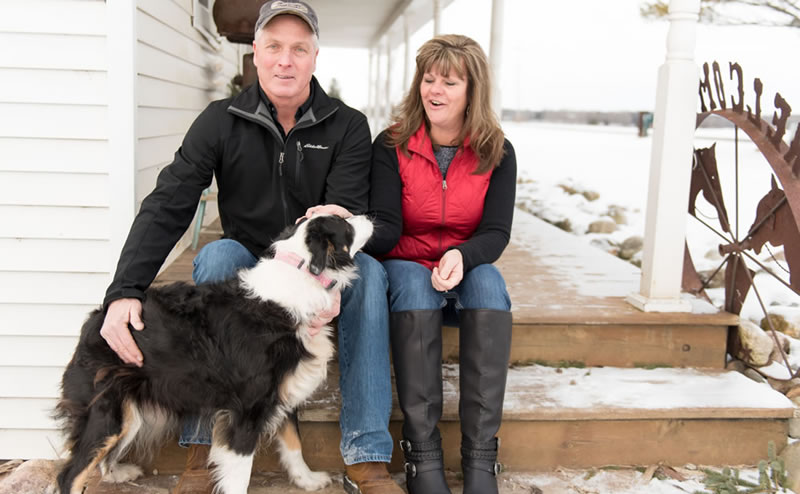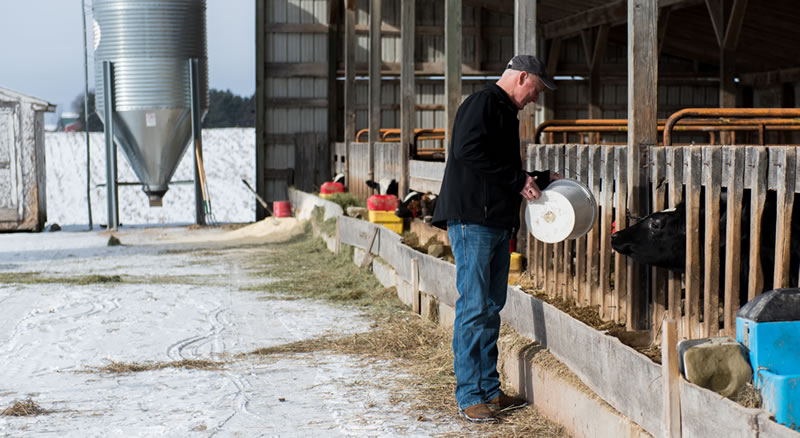Shared Science Saves Lives

A long-time sarcoma patient reflects on trusting his doctor
When Ron Diehl was diagnosed in 1999 with Ewing sarcoma, a rare cancer that mainly affects children and young adults, he wanted to speak to someone who survived the disease as a way to maintain hope that he could get better. A young man of 34, he had a wife and three young kids, as well as a family dairy farm to run in the small town of Lupton, Mich.
At the time, Ewing sarcoma treatment was mostly studied in the pediatric oncology world. Social media and online support groups did not yet exist, making it difficult to connect with other adult patients. Diehl was unable to speak to a survivor.
Little did he know that 18 years later -- thanks to advances in treatment and his extraordinary circumstances -- he would become a success story of hope for others.
The Trusted Doctor/Patient Relationship
Diehl began his cancer experience under the care of Laurence Baker, D.O., a sarcoma expert at the University of Michigan Rogel Cancer Center. Diehl responded to treatment and remained cancer-free for the next four years. In 2003, it returned and had spread into his lung.
"It overwhelmed me when it came back. I was scared to death. It was the biggest fight I ever had in my life," Diehl says
Baker, who today runs a Rogel Cancer Center clinic specifically for sarcoma survivors, explains that sarcoma responds best when treated with surgery followed by aggressive chemotherapy. Since many patients are diagnosed young, he champions treatment approaches to eradicate cancer and does not support the idea that metastatic disease means death.
Sharing Science to Advance Patient Care

"Mr. Diehl's willingness to participate in early phase clinical research after standard treatment options were used is one of the reasons his cancer remains in remission. His case highlights one of the values of a robust clinical research emphasis at a cancer center."
--Scott Schuetze, M.D., Ph.D.
At its most advanced, Diehl's sarcoma had overrun so much of his lung he had trouble breathing. Yet today he is 52 years old with no evidence of cancer. His children -- Jorie, Brandon and Josie -- are adults and help their dad and mom, Lisa, attend to the family dairy farm.
Diehl will tell you that Baker saved his life, but Baker is quick to point out that shared science is what saved his life.
Baker is a founding member of the Sarcoma Alliance for Research Through Collaboration. SARC was created as a not-for-profit group to share scientific discoveries for sarcoma treatment and to conduct clinical trials studying new treatments.
"Patients and families need to know the importance of communication between scientists and clinicians and what can evolve from that," Baker says.
Because of his work on SARC, he knew Anthony Tolcher, M.D., from San Antonio, Texas, had an option to further Diehl's treatment when the Cancer Center ran out of options. It was a phase 1 clinical trial testing of a new class of drug, a human monoclonal antibody targeting and blocking the receptor IGF1-R, for metastatic sarcoma. Michigan would have the treatment eventually, but Diehl needed it now.
"Dr. Baker told me, 'Ron, if we don't get this cancer under control it is going to take your life. I want you to go on a clinical trial in Texas.' I said, 'You've never steered me wrong so I'm going to do it,'" Diehl says.
Collaboration Leading to Cures
Diehl was the first adult patient to respond to the antibody in the sarcoma clinical trial. Eight days after his first treatment, his tumors had shrunk by 60 percent. After three more treatments, the cancer was gone.
He continued traveling to San Antonio every month until the drug became available at the Cancer Center. Today, he is treated by Scott Schuetze, M.D., Ph.D., at the Multidisciplinary Sarcoma Clinic.
"It was in part because of this dramatic response that a series of clinical trials of this class of drug was conducted in Ewing sarcoma and other sarcomas around the world," Schuetze says. "Mr. Diehl continues to remain in complete remission."
Diehl speaks about his experience in order to give hope to other sarcoma patients and to help the drug move closer to approval from the Food and Drug Administration. He is grateful to be well enough to take care of his farm and to have watched his children grow up. The family is planning the wedding of their eldest daughter, a registered nurse. His youngest two children work on the farm.
Read the Spring, 2017 issue of Thrive.
